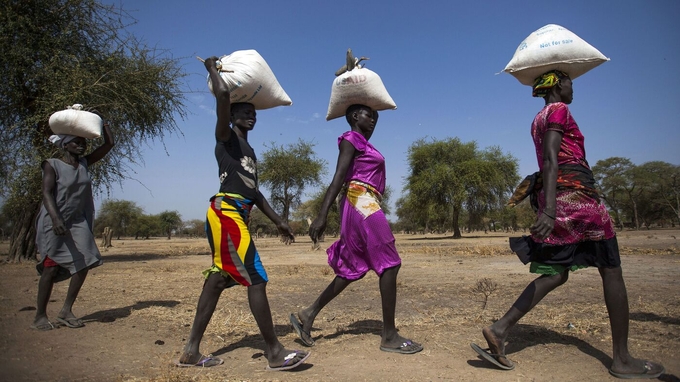June 14, 2025 | 14:41 GMT +7
June 14, 2025 | 14:41 GMT +7
Hotline: 0913.378.918
June 14, 2025 | 14:41 GMT +7
Hotline: 0913.378.918

Women carry food in gunny bags after visiting an aid distribution center in South Sudan.
In response to alarming new findings confirming famine conditions in parts of Darfur, the Food and Agriculture Organization of the United Nations (FAO) is urging an immediate cessation of hostilities, rapid scale up of life-saving food, nutrition and cash assistance as well as of the emergency agricultural aid. This is critical in conflict-affected areas to address immediate needs and avert the risk of famine from increasing and affecting other locations across Sudan.
The IPC Famine Review Committee (FRC) has conclusively found that Famine conditions are ongoing in the Zamzam Internally Displaced Persons (IDP) camp which hosts 500,000 IDPs outside of El Fasher town in Darfur.
Sudan is engulfed in an unparalleled food security crisis, facing the worst levels of hunger ever recorded by the IPC in the country, as well as the world’s largest internally displaced crisis. A staggering 755 000 people are currently facing catastrophic levels of acute hunger (IPC Phase 5) – the worst form of hunger – while a total of 25.6 million people are experiencing high levels of acute hunger (IPC Phases 3 and above).
“We are witnessing horrific famine conditions in parts of North Darfur and an increasing risk of famine in other settlements and conflict-affected areas, especially in Darfur, South Kordofan, Khartoum and Al Jazirah,” said FAO Director-General QU Dongyu. “We have been raising the alarm about this looming catastrophe, yet due to the ongoing conflict and limited humanitarian access these communities are still not getting the immediate support they need. We need urgent, concerted action to prevent an even greater catastrophe from unfolding. Famine can be halted, but the immediate cessation of hostilities is an essential first step. Peace is a prerequisite for food security, and the right to food is a basic human right".
Sudan is highly dependent on agriculture, with nearly 65 percent of its population engaged in the sector. And it is this sector, rural livelihoods and agrifood systems that are on the front line of the conflict, suffering severe damage and disruption – with cascading and worrying consequences for food security and nutrition.
The situation is likely to be further exacerbated by above-average rainfall and higher-than-average temperatures predicted across southern and central states in the Sudan due to the projected La Niña conditions from August–September. The potential flooding may increase the risk of additional crop and livestock losses, while limited humanitarian access is worsening food supply and increasing the risk of severe starvation, FAO warns.
FAO and partners are leading multi-sectoral efforts to prevent an escalation of famine condition across the country. While scaling up life-saving food and cash assistance is crucial for those facing severe food shortages, this alone cannot fill the gaps caused by decreased local food production. To address this, FAO is distributing seeds to 1.2 million farming households for the main planting season, which began in June. The campaign focuses on distributing seeds to around 6 million people across the country, including Al Jazirah, Blue Nile, White Nile, the Greater Darfur and Kordofan regions where food insecurity levels are highest. If FAO's seeds campaign is fully implemented, it will allow farmers to produce a projected harvest of 2.4 to 3.6 million tonnes of sorghum grain.
Critical livestock, fisheries and social protection interventions also remain heavily underfunded. FAO is providing vital veterinary services and plans to provide emergency livestock and fishery supplies, which is crucial for preserving the primary source of nutrition and income for millions, mitigating soaring malnutrition rates among children and stabilizing livelihoods amidst the escalating crisis.
So far in 2024, FAO and its partners have vaccinated more than 2.7 million animals against common livestock diseases, reaching over half a million pastoral and agropastoral households. A further 2.5 million animals are targeted to receive veterinary support during the winter season (November to February) benefiting a total of 170 000 households.
Urgent, scaled-up action is immediately needed not only to reverse the shocking famine conditions in Darfur, but also to support acutely food insecure communities across the Sudan. Immediate needs must be met and their livelihoods strengthened to build resilience in the face of conflicts, climate and economic shocks, preparing them for whatever lies ahead. The international community cannot wait for famine declarations, rather it must act at scale and with urgency when based on warnings as a trigger for action.
(FAO)

(VAN) Extensive licensing requirements raise concerns about intellectual property theft.

(VAN) As of Friday, a salmonella outbreak linked to a California egg producer had sickened at least 79 people. Of the infected people, 21 hospitalizations were reported, U.S. health officials said.

(VAN) With the war ongoing, many Ukrainian farmers and rural farming families face limited access to their land due to mines and lack the financial resources to purchase needed agricultural inputs.

(VAN) Vikas Rambal has quietly built a $5 billion business empire in manufacturing, property and solar, and catapulted onto the Rich List.

(VAN) Available cropland now at less than five percent, according to latest geospatial assessment from FAO and UNOSAT.

(VAN) Alt Carbon has raised $12 million in a seed round as it plans to scale its carbon dioxide removal work in the South Asian nation.

(VAN) Attempts to bring down the price of the Japanese staple have had little effect amid a cost-of-living crisis.